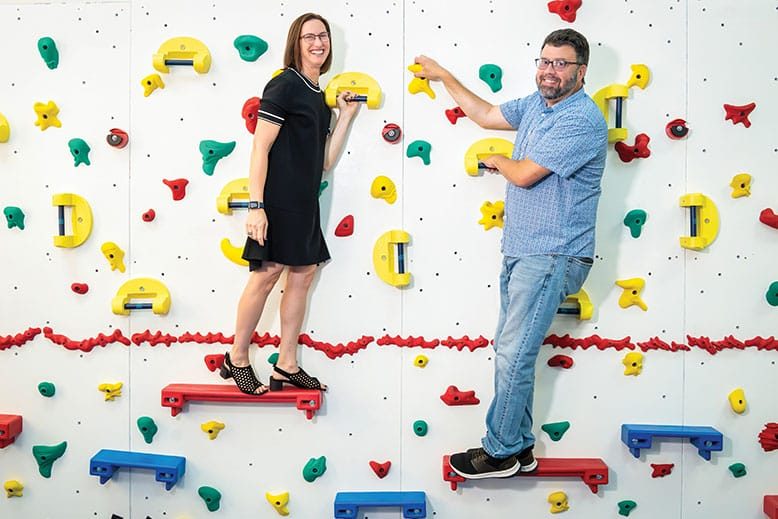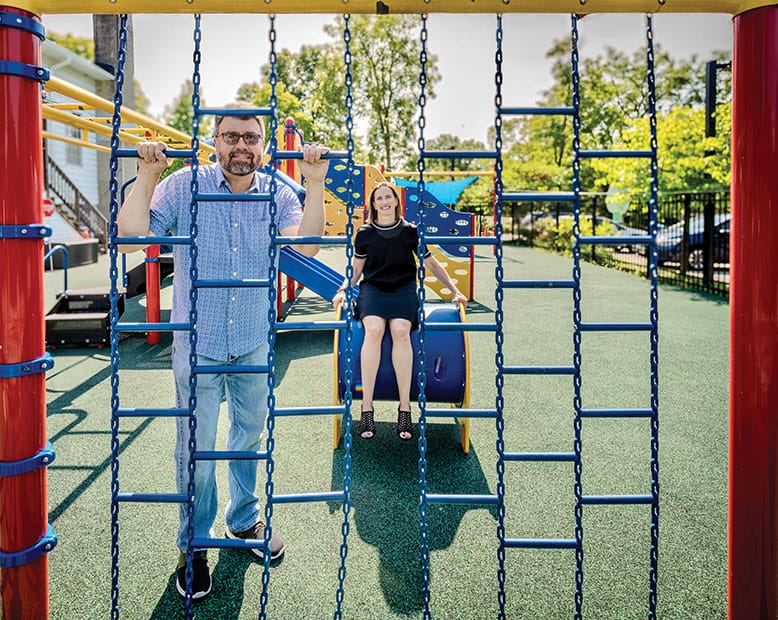
When Kyle Sevrens was born 10 weeks premature in 2006, his parents were determined to help him overcome his developmental challenges that resulted from a stroke at birth. They found a physical therapist to help him learn to sit, crawl, walk and stand; an occupational therapist to work on fine motor tasks like grasping food; and a speech therapist.
At the time, his mother, Sharon Sevrens, had just opened Amanti Vino, a wine shop in Montclair. (A Morristown store opened in 2018.) Her husband, Chris, was working long hours in finance in Manhattan, and they had another child, 3-year-old Zach. So when they found Intensive Therapeutics in West Caldwell, it was a game changer. “They’re an umbrella organization, which is such a unique concept,” says Sevrens. “Rather than having separate PT, OT and speech, you have this central repository that provides the specific therapies that the kids need, which is so incredibly helpful. They’re not just looking at, ‘How is he doing from an occupational therapy perspective?’ It’s, ‘How is his whole body moving, and how is his psyche?’ They’re all about the whole child and how they can help kids reach their potential.”

Buy our November 2024 issue here. Cover photo: Nick Misani
Another unique aspect of the program is its intensive summer camp, where kids work on life skills for six hours a day, five days a week for a month. Scott Matthews, the center’s founder and executive director, says this intensive approach is based on research on the neuroplasticity of the brain. “If you practice, if you do things enough, anybody’s brain can change,” he says. “It’s not miracles, it’s not magical. We’ve created a way for kids to work hard, but also for it to be fun.”
Today, campers come from across the country and as far away as Australia. And Kyle, who started at Intensive Therapeutics at age three, is now a happy, confident high school senior who is learning to drive, testing for his second-degree black belt, and visiting prospective colleges.
To his parents, Kyle’s journey has been nothing short of miraculous. Along with their son’s grit and determination, they credit Matthews’s novel approach with changing the trajectory of their son’s life. But they didn’t just drop Kyle at his therapy and get on with their busy lives. Instead, Sharon threw herself into helping Matthews expand the center so it could transform other kids’ lives, too.
Since 2005, when Matthews opened Intensive Therapeutics, Sevrens’s support has been key, he says. She worked with other parents to help him secure an old church for the center, then started hosting wine-pairing events for her Amanti Vino customers to raise money for improvements, equipment and scholarships. To date, she has raised more than $220,000, including funding the center’s playground in 2018 and a climbing wall in 2023.

Scott Matthews and Sharon Sevrens at the playground at Intensive Therapeutics. Photo: Andy Foster
“The fundraisers that Sharon has done have helped tremendously, from equipment to bringing costs down to staffing, just everything across the board,” says Matthews. “It’s been a wonderful relationship.”
The summer camp, which now has two sessions of 50 kids each, is key to the center’s success. In the early years, the focus was on kids with hemiplegia or hemiparesis—paralysis or weakness, respectively, on one side of the body. During Camp Helping Hands, the unaffected hands of kids with hemiplegia are immobilized in casts to force them to strengthen their weaker sides; kids with hemiparesis engage in movement therapy. The camp is now open to children and young adults with autism, cerebral palsy or general developmental delays, with programs adjusted to their ages and conditions.
Learning these tasks is easier in a group of peers with similar issues. “It motivates them to work together and have fun at the same time,” Matthews says. “Kids who are six want to learn to ride a bike, feed themselves, get dressed by themselves. That is key to the motivation and the practice; it’s, Wow, somebody else can do that. We joke that we have the happiest kids on the planet when they’ve learned how to button their buttons, zipper their pants, tie their shoes. Basic things that people take for granted are really hard for these kids to do.”
As the program’s earliest participants have grown and their needs have changed, the center has responded. A bike-riding program was started after parents asked for help teaching their children to ride two-wheelers, and a low-speed electric vehicle helps teens learn how to drive. During the school year, there’s a model house where they can learn to cook, clean and live independently. A teen series walks kids through going to the supermarket, meal planning and preparation, and how to do laundry and set up a budget.
“We would call [Matthews] and say, ‘Next summer, Kyle’s going to sleepaway camp. He needs to know how to make a bed for his bunk and how to carry a tray with two hands,” says Sevrens. “Whatever the kids need, he figures out a way to offer it.”
The playground and climbing wall that were funded by Amanti Vino fundraisers reflect Matthews’s philosophy. “It’s not an adaptive playground,” he says. “It’s a regular playground with slides and monkey bars and a spongy surface to make kids feel safe to explore. If they need adaptations, we can absolutely help them with that. But we want them to start with what everybody else does and see if we can practice over time to get better at it.”
[RELATED: 6 Inclusive and Accessible Playgrounds in New Jersey]
Unfortunately, providing intensive therapy to those who need it is an ongoing struggle. Health insurance companies, whose billing systems are based on an hour or so of weekly therapy, rarely cover more than a fraction of the camp’s costs. “Our model is just not as reimbursable as individual therapies,” says Matthews. “There’s no coding for a six-hour, five-day-a-week program. I’m still scratching my head; why don’t the insurance companies and other sources fund it? Our approach works, and it’s cheaper and more effective. Insurance should pay for it; it should be part of the billing system.”
Matthews gets frequent calls from prestigious hospitals and universities asking how he achieves his dramatic results, but two decades after the findings on neuroplasticity came out, he’s still an outlier. He’s doing his best to spread the word. This fall, he’s presenting research on the summer program at a meeting of the American Academy for Cerebral Palsy and Developmental Medicine. “Anecdotally, we’ve seen awesome changes,” he says. “Once we get our data analyzed, I’m ready to go to any insurance company and stack this up against anybody else.”
Meanwhile, he does what he can to help families of limited means with a sliding scale and scholarships. “The first question we ask shouldn’t be, ‘Do they have insurance?’ It should be, ‘Can we help them or not?’”
The support of Sevrens and other donors is “instrumental” in providing access to the program, Matthews says. He set up Intensive Therapeutics as a 501c3 nonprofit, which is unusual for a physical therapy business, to facilitate donations and be financially transparent. “You can look us up and all of our IRS filings from the beginning. I wanted to bring in funds to help people who couldn’t access our services, to show that our model is based on research, and to let people know that we are not ripping them off.
“Our big goal is that this should be free and accessible to everybody,” he says. “We’re a long way from that, but we’re trying to help in our own little way.”
No one knows New Jersey like we do. Sign up for one of our free newsletters here. Want a print magazine mailed to you? Purchase an issue from our online store.



